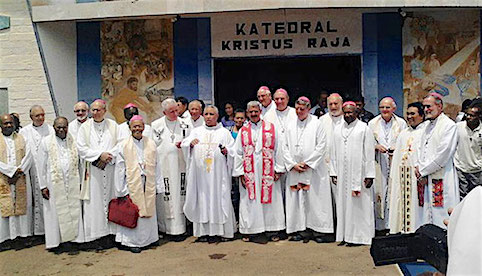Last week 23 bishops made a rare visit to Indonesia’s most easterly province, West Papua.
Catholic Bishops of Papua New Guinea and Solomon Islands have been meeting at St.Anthony’s Pilgrim House, Vanimo, for their Annual General Meeting from 4 to 15 April 2016.
The bishops had a meeting with 4 of the 5 bishops of West Papua.
They discussed issues of cooperation between the dioceses of West Papua and the dioceses of PNG/SI.
The issue of the refugees and the cry of independence of the people of West Papua were also discussed.
The bishops heard about on-going violence and repression faced by Papuan people.
In a letter presented to the bishops, Catholic Women of West Papua wrote of the significance of the visit.
“Few foreigners and even fewer esteemed guests like yourselves are able to get permission to come, or are willing to risk visiting our country,” the statement said.
“We want you to know that we are not free.
We are confined in a situation that is full of violence.
Because of the Indonesian police and military we do not feel safe in our own land.
We desire to determine our own future, freely and fairly.
We want you to know that the United Liberation Movement for West Papua represents us. They have our full support.
Sadly the Catholic Church in West Papua is largely silent about this and does not give voice to our cry for justice.”
The letter calls on the Conference of Bishops to encourage the Pacific Island Forum to immediately send a human rights fact-finding. mission to West Papua.
The bishops will come up with a statement at the end of the meeting.
The bishops’ visit to Jayapura, follows the release of a Church report released last month containing allegations of recent military and police intimidation, beatings and torture, kidnapping and murder in West Papua.
The report author, Josephite Sister Susan Connelly, a respected human rights advocate, visited West Papua, accompanied by Brisbane archdiocese’s Catholic Justice and Peace Commission executive officer Peter Arndt.
They interviewed more than 250 Papuan community leaders.
Connelly compared the situation there to “stepping back twenty years when I first went to East Timor”.
“The same oppressive security presence everywhere, the same suspicion, bewilderment, frustration and sadness,” she said.
Source
